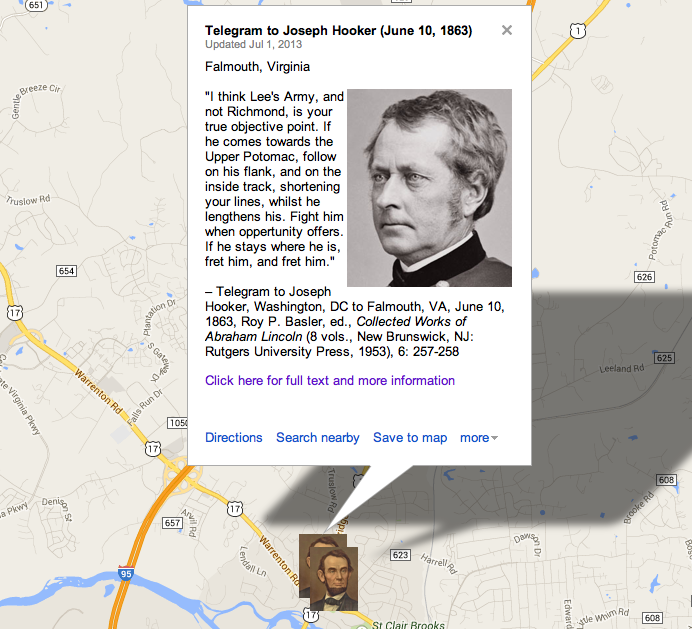Ranking
#116 on the list of 150 Most Teachable Lincoln Documents
Annotated Transcript
“I think Lee’s Army, and not Richmond, is your true objective point.”
On This Date
HD Daily Report, June 10, 1863
The Lincoln Log, June 10, 1863
Custom Map
How Historians Interpret
“Lee was indeed planning to move into Pennsylvania. He began to do so in the second week of June. For the third time in thirteen months, Lincoln saw a Confederate offensive as an opportunity rather than a threat. As he had done so during Jackson’s Shenandoah Valley campaign in May 1862 and during Lee’s invasion of Maryland the previous September, the president urged his army commander to attack or trap the enemy far from his home base. But as the Army of Northern Virginia began to march up the south bank of the Rappahannock toward the Shenandoah Valley, Hooker proposed to attack the corps Lee had left as a rear guard in the trenches near Fredericksburg. Both Lincoln and Halleck (whom the president brought into communication with Hooker) disapproved. Halleck wanted Hooker to ‘fight [the enemy’s] movable column first, instead of attacking his intrenchments, with your own forces separated by the Rappahannock.’ Lincoln put it more colorfully, using a typically pointed simile. When ‘you find Lee coming to the North of the Rappahannock, I would by no means cross to the South of it,’ advised the president. ‘I would not take the risk of being entangled upon the river, like and ox jumped half over a fence, and liable to be torn by dogs, front and read, without a fair chance to gore one way or kick another.’ Five days later, when it became clear that Lee’s whole army was leaving Fredericksburg, Hooker requested Lincoln’s permission to move quickly fifty miles south to attack the lightly defended Richmond defenses. ‘To march to Richmond at once,’ he said, would be ‘the most speedy and certain mode of giving the rebellion a mortal blow.’ Lincoln must have shaken his head in frustration when he read this telegram. He immediately wired Hooker: ‘Lee’s Army, and not Richmond, is your true objective point. . .’ By June 14 Union intelligence had learned that the Army of Northern Virginia was strung out almost sixty miles from Winchester back to Chancellorsville. ‘The animal must be very slim somewhere,’ the president telegraphed Hooker. ‘Could you not break him?'”
–James M. McPherson, Tried by War: Abraham Lincoln as Commander in Chief (New York: Penguin, 2008)
“Ignoring this advice, Hooker on June 10 proposed to forget about Lee and march toward Richmond. Lincoln, who thought ‘it would be a very poor exchange to give Washington for Richmond,’ immediately vetoed that suggestion. ‘If left to me, I would not go South of the Rappahannock, upon Lee’s moving North of it,’ the president wrote. ‘If you had Richmond invested to-day, you would not be able to take it in twenty days; meanwhile, your communications, and with them, your army would be ruined. I think Lee’s Army, and not Richmond, is your true objective point. If he comes towards the Upper Potomac, follow on his flank, and on the inside track, shortening your lines, whilst he lengthens his. Fight him when oppertunity offers. If he stays where he is, fret him, and fret him.’ Alarmed by Hooker’s evident unwillingness to confront the enemy, Lincoln planned to visit the front to consult with him. But he aborted that trip when Stanton and Halleck warned that it was too perilous to visit the general’s ever-shifting headquarters when that area could become the scene of battle.”
–Michael Burlingame, Abraham Lincoln: A Life (2 volumes, originally published by Johns Hopkins University Press, 2008) Unedited Manuscript by Chapter, Lincoln Studies Center, Volume 2, Chapter 30 (PDF), 3338-3339.
NOTE TO READERS
This page is under construction and will be developed further by students in the new “Understanding Lincoln” online course sponsored by the House Divided Project at Dickinson College and the Gilder Lehrman Institute of American History. To find out more about the course and to see some of our videotaped class sessions, including virtual field trips to Ford’s Theatre and Gettysburg, please visit our Livestream page at http://new.livestream.com/gilderlehrman/lincoln

